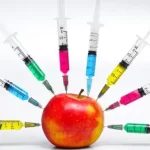Stop Eating These Ten American Foods That Are Banned in Other Countries
The post Stop Eating These Ten American Foods That Are Banned in Other Countries appeared first on Healthy Holistic Living.
Imagine learning that the meal you just consumed contained chemicals used in yoga mats, preservatives found in wax food packaging, and a key component of rat poison. For people in the United States, that’s an unfortunate reality.
In the U.S., unnaturally colored foods and hormone-filled meats are commonplace, but many of these items are banned in countries worldwide. While the dairy industry is up in arms about almond milk being called “milk,” the fact that U.S. milk is banned in the European Union and Canada due to potential health risks goes unnoticed. Almond “milk” seems like a more attractive option now, doesn’t it?
Get acquainted with foods that are commonly sold in the U.S. but banned in other countries before your next grocery shopping trip; it might change your shopping habits.
Mountain Dew: Containing Brominated Vegetable Oil (BVO), a food additive linked to skin irritation, headaches, memory loss, and impaired balance and coordination, Mountain Dew is banned in the European Union, India, and Japan.
Post Honey Maid S’mores: This cereal and others containing the preservative Butylated Hydroxytoluene (BHT), thought to be a human carcinogen, are banned in the UK, Australia, New Zealand, Japan, and much of Europe.
Skittles: Banned in Norway and Sweden due to artificial colors yellow 5 and yellow 6, which may cause allergic reactions and hyperactivity in children.
rBGH or rBST Milk: Milk containing this synthetic growth hormone is banned in the European Union and Canada due to potential health risks, including increased cancer risk.
M&Ms: Made with artificial colors in the U.S. but natural colors in Europe, which has stricter ingredient regulations.
Bread Products: Some U.S. bread products, including Jimmy Dean Delights Turkey Sausage, Egg & Cheese Honey Wheat Flatbread, and Pillsbury Breadsticks, contain azodicarbonamide, a chemical used in yoga mats and shoe soles, linked to respiratory problems and other health issues.
Chlorine-Washed Chicken: Banned in the European Union since 1997 due to concerns about hygiene standards earlier in the food chain.
Instant Mashed Potatoes: Contain Butylated Hydroxyanisole (BHA), a preservative potentially harmful to humans, which is banned in the European Union, Japan, Australia, and other countries.
U.S. Pork: Majority of U.S. pigs are treated with the drug ractopamine, banned in 160 nations including the European Union, Russia, and China, due to potential effects on the cardiovascular system and behavioral changes.
U.S. Bread, Rolls, and Buns: Some products contain potassium bromate, a food additive linked to cancer, which is banned in Europe, Canada, Brazil, South Korea, Nigeria, and Peru.
U.S. Beef: Synthetic hormones used to promote growth in cattle, such as Zeranol, Trenbolone acetate, and Melengestrol acetate, are linked to increased breast and prostate cancer risk and are banned in the European Union.
Other countries, particularly those in the European Union, have stricter regulations on food ingredients due to their adherence to the precautionary principle. This principle emphasizes that if an action or policy has the potential to cause harm to the public or the environment, in the absence of scientific consensus, the burden of proof falls on those advocating for the action or policy. This approach results in more rigorous safety assessments and the banning of certain ingredients that may pose health risks. The European Union, along with other countries, prioritize public health and consumer safety, implementing more stringent guidelines on the use of potentially harmful additives and chemicals in food products.
In the United States, however, the regulatory approach is generally more lenient. Regulatory bodies, such as the Food and Drug Administration (FDA), often require significant evidence of harm before taking action to ban or restrict certain ingredients. Additionally, powerful lobbying by the food industry can influence the regulatory process, making it difficult to ban or restrict potentially harmful substances. Furthermore, there is a focus on cost-effectiveness and market competition in the U.S., which may lead to prioritizing these factors over consumer health and safety. As a result, several controversial food additives and practices are allowed in the American food industry, even though they may be banned or restricted in other countries.
The disparity between food regulations in the United States and other countries serves as a reminder to consumers to stay informed and vigilant about the ingredients in the food they consume. It is crucial to prioritize health and safety when choosing food products and be aware of potentially harmful additives and practices that might be present. By educating oneself on these matters and making conscious choices, individuals can protect their well-being and advocate for stricter food regulations. It is essential that consumers and governments alike work together to ensure a safer and healthier food supply for all.
The post Stop Eating These Ten American Foods That Are Banned in Other Countries appeared first on Healthy Holistic Living.










